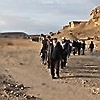Answer: The Kabbalistic meaning of the holiday is that, having discovered ourselves to be absolute egoists who have no connection with the spiritual world and who live only their animal lives, we realize that we must shake off the dust of egoism from ourselves and begin to live with the Light within the heart—with the aspiration toward a heartfelt connection with each other.
Only in the connection between us can the upper world, the upper force, be revealed. Lighting a little flame between us—the quality of bestowal and mutual love—is called “Hanukkah.” From that little Light called Nefesh, then Ruach, Neshama, Haya, and Yechida, which are all mutual friendly relations, gradually begin to blossom, which lets us connect all our qualities and aspirations between us and begin to feel ourselves as one supportive, kind family.
This happens gradually. There are seven stages in the spiritual world: Chesed, Gevurah, Tifferet, Netzach, Hod, Yesod, and Malchut. It is just that we are rising from the bottom up, from Malchut to the highest, to Chesed, igniting within ourselves ever-greater light.
This is what Hanukkah represents (from Hebrew “hanu-kah,” “hanaya” ‑ stopover). After this stopover, there is a period until Purim when we achieve the Sefirot above Chesed: Bina, Hochma, and Keter. Then, absolute unity and complete enlightenment and the consecration of our mutual connection will be achieved, when we actually become as one whole, one soul, called “Adam.”
We have to aspire to this, because this is the goal of our lives, our existence, the goal of creation.
Question: Where in this path are the Greeks?
Answer: The Greeks are between us, these are forces that separate us, prevent us from uniting, push us away from each other, as the Egyptians had done earlier.
In other words, everything that prevents our unity and adhesion are called either the Egyptians, the Romans or the Greeks, depending on the level. But, in principle, it is our egoism.
Even now we obey the Egyptians and the Romans and the Greeks—the so-called “nations of the world,” who exist within us—the egoistic forces that control us.
Question: So right now we are not at war with them?
Answer: Not at all. What war? On the contrary, we invite all our external enemies to us. We don’t even consider them as enemies. We are elitists. We think that their culture, science, and education are what is best for us. We are not even planning on uniting.
Question: In other words, we want to live like them, but we should want to live like the nation of Israel?
Answer: Living like the nation of Israel doesn’t mean sitting from morning to night reading the Torah. We must build the right kind of society in which everyone would be connected by the laws of friendship and love. “Love your neighbor as yourself” is the main law of the Torah that we must begin to obey.
Question: When will the Maccabees come and start the war?
Answer: We are trying to do it as much as we can.
Question: Will it happen suddenly? In the last moment, when everything comes to a dead end, in suffering?
Answer: Hopefully it will not carry out like that. The Maccabees came when there was no other alternative, and Judah Maccabee screamed: “Whoever is for the Creator, follow me!”
Nonetheless, let’s hope that we will, gradually, through the dissemination of Kabbalah, come to a time when people will begin to understand us and will want to approach this idea.
Question: If we are talking in terms of the material world, then the Maccabees were Kabbalists?
Answer: Of course. “Everyone who is for the Creator, to me!” is a Kabbalistic call, that is: “Let’s unite! We agree to be the central point of connection.” Judah Maccabee was a great scholar, a great sage, a Cohen, and that is why he was able to do that. On his spiritual level he really did have the power to draw the entire nation to himself.
Question: In other words, the Creator, essentially, is unity?
Answer: Yes. The experience of unity or the experience of the Creator is one and the same. The Creator is not something that exists outside of us, but rather that force of unity and love that we achieve. We call it the Creator.
[218141]
From KabTV’s “Kabbalistic Meaning of Hanukkah,” 12/7/17
[218141]
From KabTV’s “Kabbalistic Meaning of Hanukkah,” 12/7/17


No comments:
Post a Comment